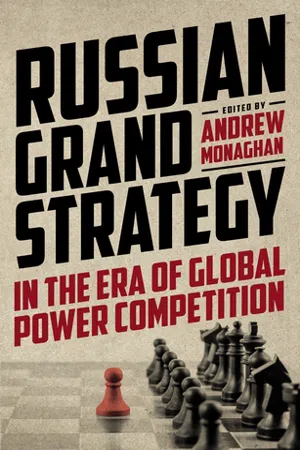
- 224 pages
- English
- ePUB (mobile friendly)
- Available on iOS & Android
Russian Grand Strategy in the era of global power competition
About this book
This book offers a nuanced and detailed examination of two of the most important current debates about contemporary Russia's international activity: is Moscow acting strategically or opportunistically, and should this be understood in regional or global terms? The book addresses core themes of Russian activity – military, energy and economic - but it offers an unusual multi-disciplinary analysis to these themes. Monaghan incorporates both regional and thematic specialist expertise to give a fresh perspective to each of these core themes.Underpinned by detailed analyses of the revolution in Russian geospatial capabilities and the establishment of a strategic planning foundation, the book includes chapters on military and maritime strategies, energy security and economic diversification and influence. This serves to highlight the connections between military and economic interests that shape and drive Russian strategy.
Frequently asked questions
- Essential is ideal for learners and professionals who enjoy exploring a wide range of subjects. Access the Essential Library with 800,000+ trusted titles and best-sellers across business, personal growth, and the humanities. Includes unlimited reading time and Standard Read Aloud voice.
- Complete: Perfect for advanced learners and researchers needing full, unrestricted access. Unlock 1.4M+ books across hundreds of subjects, including academic and specialized titles. The Complete Plan also includes advanced features like Premium Read Aloud and Research Assistant.
Please note we cannot support devices running on iOS 13 and Android 7 or earlier. Learn more about using the app.
Information
1
Mapping the globe, and the revolution in Russia's geospatial capability
Evaluating the cartographic legacy of the Soviet Union
Table of contents
- Cover
- Half-title page
- Series page
- Title page
- Copyright page
- Contents
- List of maps, figures, and tables
- List of contributors
- Foreword
- Preface
- Acknowledgements
- Introduction
- 1: Mapping the globe, and the revolution in Russia's geospatial capability
- 2: Russia's global maritime strategy
- 3: Sixth-generation war and Russia's global theatres of military activity
- 4: Looking to the global economy: Russia's role as a supplier of strategically important goods
- 5: Polar power: Russia's twenty-first-century power base
- 6: Strategic planning and management in Russia
- Conclusions
- Index